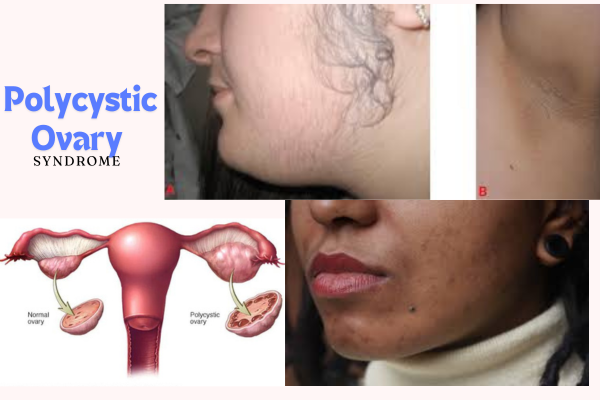Table of Contents
TogglePolycystic ovary syndrome (PCOS)
Polycystic ovary syndrome (PCOS) is a common hormonal disorder that affects women of reproductive age. Despite its prevalence, it remains underdiagnosed and often misunderstood. This blog aims to provide a thorough understanding of PCOS, including its causes, symptoms, diagnosis, treatment and lifestyle management.
What is polycystic ovary syndrome (PCOS)?
PCOS is a condition characterized by the presence of multiple cysts on the ovaries and a range of symptoms resulting from hormonal imbalance. Women with PCOS produce higher than normal levels of male hormones, called androgens. This hormonal imbalance can cause a variety of problems, including irregular periods, difficulty conceiving, and other health problems.
Understanding the Causes of Polycystic Ovary Syndrome (PCOS)
The exact causes of PCOS are not fully understood, but research has identified several important factors that contribute to the development of the condition. In this detailed note, we will explore the various possible causes of PCOS, providing a comprehensive understanding of the underlying mechanisms leading to this disorder.
Genetic predisposition
A family trend
PCOS often runs in families, suggesting a strong genetic component. If a mother, sister, or other close female relative has PCOS, the chance of developing the condition increases. Studies have identified specific genetic mutations associated with PCOS, although the exact genes and their mechanisms are still being researched.
Genetic studies
Genetic research has pointed to several genes that may be involved in the regulation of androgen production, insulin resistance, and the inflammatory response. However, the inheritance pattern of PCOS is complex, and it is likely that multiple genes interact with environmental factors to trigger the condition.
Insulin resistance
The role of insulin
Insulin is a hormone produced by the pancreas that regulates blood sugar levels. Insulin resistance occurs when the body’s cells do not respond effectively to insulin, leading to elevated blood sugar levels and increased insulin production.
Hyperinsulinemia and androgen production
High levels of insulin, or hyperinsulinemia, is a common feature in women with PCOS. Excess insulin can stimulate the ovaries to produce more androgens (male hormones) such as testosterone. This increase in androgen production can disrupt normal ovarian function, leading to the development of cysts and other symptoms of PCOS.
Metabolic Implications
Insulin resistance is also associated with obesity, particularly abdominal obesity, which can exacerbate PCOS symptoms. The relationship between insulin resistance and PCOS is complex and bidirectional, with each condition potentially exacerbating the other.
Hormonal imbalance
Androgens
Women with PCOS usually have high androgen levels. Androgens are normally present in small amounts in women, but high levels can cause symptoms such as hirsutism (excess hair growth), acne and alopecia (hair loss). The ovaries and adrenal glands produce these hormones, and in PCOS, their production is often dysregulated.
Luteinizing Hormone (LH)
An imbalance between luteinizing hormone (LH) and follicle-stimulating hormone (FSH) is common in women with PCOS. Elevated levels of LH relative to FSH can stimulate the ovaries to produce more androgens, disrupting normal ovulation and contributing to menstrual irregularities.
Estrogen and progesterone
Women with PCOS often have an imbalance in estrogen and progesterone levels. These hormonal fluctuations can increase the risk of period irregularities, heavy bleeding, and endometrial hyperplasia (thickening of the lining of the uterus), which can increase the risk of endometrial cancer over time.
inflammation
Chronic low-grade inflammation
Chronic low-grade inflammation is commonly seen in women with PCOS. This type of inflammation can lead to insulin resistance and increased androgen production.
Signs of inflammation
Studies show that women with PCOS have higher levels of markers of inflammation, such as C-reactive protein (CRP), in their blood. This inflammation may contribute to the development and progression of PCOS by affecting ovarian function and insulin sensitivity.
Environmental and lifestyle factors
Diet and nutrition
Dietary habits can affect the risk and severity of PCOS. Diets high in refined carbohydrates and sugars can worsen insulin resistance and lead to weight gain, which can exacerbate PCOS symptoms. Conversely, a balanced diet rich in whole foods, fiber and lean protein can help regulate insulin levels and reduce symptoms.
Physical activity
A sedentary lifestyle is associated with insulin resistance and weight gain, both of which are risk factors for PCOS. Regular physical activity can help improve insulin sensitivity, promote weight loss, and reduce PCOS symptoms.
Stress
Chronic stress can affect hormonal balance and contribute to the development of PCOS. Stress can increase cortisol levels, which in turn can affect insulin resistance and androgen production. Stress management techniques such as yoga, meditation, and deep breathing exercises may be beneficial for women with PCOS.
symptoms of polycystic ovary syndrome (PCOS).
Polycystic ovary syndrome (PCOS) is a complex endocrine disorder characterized by a variety of symptoms. These symptoms can vary widely between individuals, both in type and severity. Understanding these symptoms is crucial for early diagnosis and effective management of PCOS. This detailed note explores the main symptoms associated with PCOS, providing a comprehensive overview for sufferers and their healthcare providers.
Irregular menstruation
One of the prominent symptoms of PCOS is irregular periods. This may include:
Oligomenorrhoea
This refers to infrequent menstruation. Women with PCOS may experience cycles longer than 35 days, resulting in fewer than eight periods a year.
Amenorrhea
In some cases, women with PCOS may experience a complete absence of periods for three months or more.
Menorrhagia
PCOS can also cause heavy menstrual bleeding, called menorrhagia, which can lead to anemia and fatigue.
Hyperandrogenism
Elevated levels of androgens (male hormones) are a common feature of PCOS, leading to several prominent symptoms:
Hirsutism
Excessive hair growth, or hirsutism, is one of the most troubling symptoms of PCOS. Women may develop thick hair in areas where men usually grow hair, such as the face, chest, back, and abdomen.
Acne
Severe and persistent acne is another symptom caused by high androgen levels. These acne are often resistant to common treatments and can leave scars.
Alopecia
Androgenic alopecia, or male pattern baldness, involves thinning of the hair on the scalp, especially on the crown and temples. This can significantly affect self-esteem and confidence.
Polycystic ovary
Ultrasound results
Polycystic ovaries seen on ultrasound are characterized by the presence of multiple small cysts or follicles. Although not all women with PCOS will have polycystic ovaries, it is a common diagnostic criterion.
Uterine disorders
These cysts are the result of follicles that have failed to mature and release an egg, disrupting ovulation and causing menstrual irregularities.
Metabolic symptoms
Women with PCOS often show metabolic symptoms, which can increase the risk of long-term health problems:
Weight gain and obesity
Many women with PCOS struggle with weight gain, especially around the abdomen. This central obesity is an important risk factor for metabolic syndrome.
Insulin resistance
Insulin resistance, a condition where the body’s cells do not respond effectively to insulin, is common in women with PCOS. This can lead to high insulin levels and an increased risk of developing type 2 diabetes.
Acanthosis nigricans
The condition involves dark, velvety patches of skin, often found on the neck, arms, and back. It is associated with insulin resistance and may be an early sign of metabolic syndrome.
Reproductive symptoms
PCOS can have a profound effect on fertility and reproductive health:
infertility
Due to irregular ovulation or anovulation (absence of ovulation), many women with PCOS have difficulty conceiving. This can be a major source of stress and emotional distress.
Pregnancy complications
Women with PCOS are at increased risk of complications during pregnancy, including gestational diabetes, preeclampsia, and premature birth. Regular monitoring and management by health care providers is essential.
Psychiatric symptoms
Hormonal imbalances and physical symptoms of PCOS can also affect mental health:
Depression and anxiety
Women with PCOS are more prone to depression and anxiety. These conditions can arise from hormonal imbalances, the physical symptoms of PCOS, and the emotional impact of fertility problems.
Body image and self-esteem.
Symptoms such as hirsutism, acne, and weight gain can negatively affect body image and self-esteem. This can lead to social withdrawal and reduced quality of life.
Sleep disorder
Obstructive sleep apnea
Women with PCOS, especially those who are overweight, have a higher prevalence of sleep apnea. This condition is caused by repeated interruptions in breathing during sleep, leading to poor sleep quality and daytime fatigue.
Skin conditions
Skin tags
Small, benign growths known as skin tags can appear in areas where there is a layer of skin, such as the neck, armpits and under the breasts. These are more common in women with PCOS and insulin resistance.

Diagnosis of PCOS
A diagnosis of PCOS usually includes a combination of the following:
Medical history: Your doctor will ask about your menstrual periods, weight changes, and other symptoms.
Physical exam: A physical exam can check for signs of excess hair growth, insulin resistance, and acne.
Blood tests: Blood tests can measure hormone levels to rule out menstrual irregularities or other causes of androgen excess.
Ultrasound: A pelvic ultrasound can look at the appearance of your ovaries and the thickness of your uterine lining.
Treatment of PCOS
Treatment for PCOS focuses on managing symptoms and reducing the risk of long-term health complications. A combination of lifestyle changes, medications, and in some cases, surgical interventions are used.
Lifestyle changes
Dietary changes
Balanced diet: Emphasize whole grains, lean protein, healthy fats, and plenty of fruits and vegetables.
Low Glycemic Index (GI) Foods: Choose foods that help regulate insulin levels.
Cut back on sugar and refined carbohydrates: Limit consumption to control blood sugar levels and reduce insulin resistance.
Physical activity
Aerobic exercise: Activities such as walking, jogging, swimming, and cycling improve cardiovascular health and insulin sensitivity.
Resistance training: Strength training exercises increase muscle mass and improve metabolic rate.
Consistency: Aim for at least 150 minutes of moderate aerobic exercise per week, along with strength training two or more days per week.
Weight management
Healthy weight: Maintaining a healthy weight can improve PCOS symptoms and reduce the risk of complications.
Medicines
Hormonal contraceptives
Combined oral contraceptives (COCs): regulate the menstrual cycle, reduce hirsutism and acne, and reduce the risk of endometrial cancer.
Anti-androgen medications
Spironolactone: Reduces excessive hair growth and acne by blocking androgen receptors.
Insulin sensitizers
Metformin: Improves insulin sensitivity and lowers insulin levels, helps regulate the menstrual cycle and promote ovulation.
Fertility treatments
Clomiphene Citrate: Induces ovulation.
Letrozole: Effective in inducing ovulation when clomiphene citrate fails.
Gonadotropins: injectable hormones to stimulate ovulation.
Surgical options
Ovarian drilling
Laparoscopic procedure: Small punctures in the ovaries to reduce androgen production and stimulate ovulation.
Alternative and complementary therapies
Acupuncture
Benefits: May improve menstrual regularity and reduce insulin resistance.
Herbal supplements
Inositol: Improves insulin sensitivity and ovulation rate.
Cinnamon: Ability to improve insulin sensitivity and regulate menstrual cycles.
Regular monitoring and follow-up
Routine Checkups: Monitor symptoms, adjust treatment plans, and address new health concerns.
Laboratory Tests: Monitor hormone levels, blood sugar, and lipid profiles.
Imaging studies: Ultrasound exams to assess ovarian size and the presence of cysts.
The result
Polycystic ovary syndrome (PCOS) is a multifaceted condition that requires a holistic and individualized approach to treatment. By combining lifestyle changes, medications, surgical options, and complementary therapies, women with PCOS can effectively manage their symptoms and improve their quality of life. Regular monitoring and collaboration with health care providers is essential to improve treatment outcomes and reduce the risk of long-term complications.

